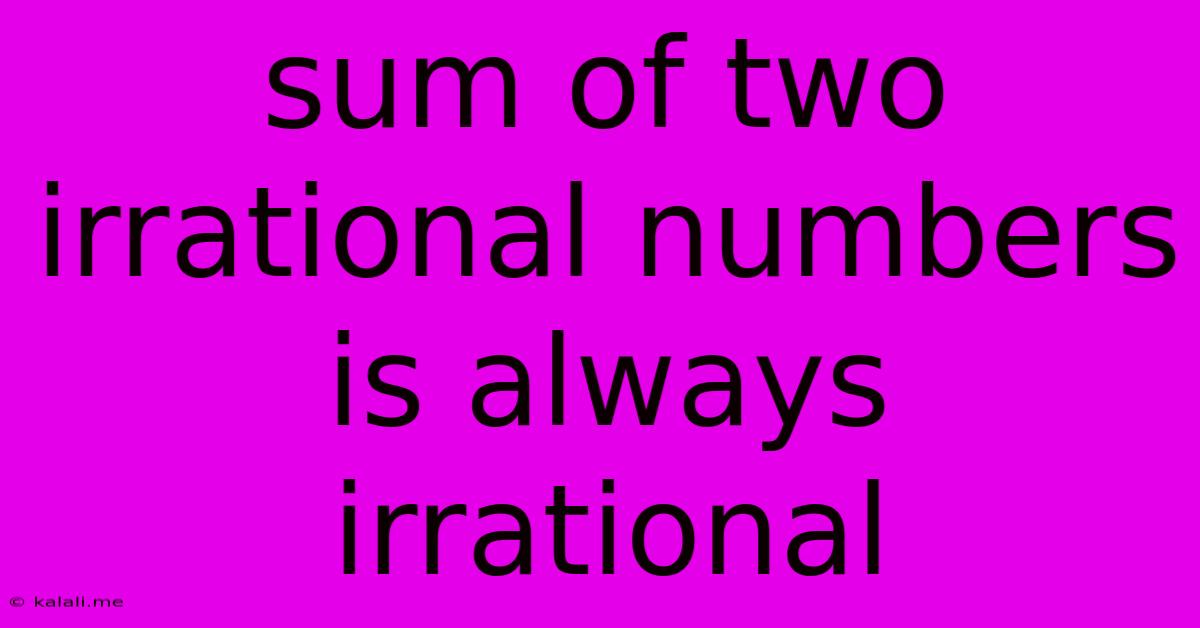Sum Of Two Irrational Numbers Is Always Irrational
Kalali
Jun 13, 2025 · 3 min read

Table of Contents
Is the Sum of Two Irrational Numbers Always Irrational? A Deep Dive
Meta Description: Explore the fascinating world of irrational numbers and discover whether adding two irrational numbers always results in another irrational number. We'll delve into proofs and counterexamples to unravel this mathematical mystery.
The question of whether the sum of two irrational numbers is always irrational is a deceptively simple one. Intuitively, you might expect it to be true. After all, irrational numbers are, by definition, numbers that cannot be expressed as a simple fraction (a ratio of two integers). However, the reality is more nuanced. The short answer is: no, the sum of two irrational numbers is not always irrational.
Let's explore this with a detailed explanation and some illustrative examples.
Understanding Irrational Numbers
Before we dive into the sum, let's briefly revisit what defines an irrational number. Irrational numbers are numbers that cannot be expressed as a fraction p/q, where p and q are integers, and q is not zero. Famous examples include π (pi), e (Euler's number), and the square root of 2 (√2). These numbers have decimal representations that neither terminate nor repeat.
Counterexample: Proving the Statement False
To disprove the statement "the sum of two irrational numbers is always irrational," we only need one counterexample. Consider these two irrational numbers:
- a = √2
- b = -√2
Both 'a' and 'b' are irrational. However, their sum is:
a + b = √2 + (-√2) = 0
And 0 is a rational number (it can be expressed as 0/1). This single counterexample is sufficient to prove that the statement is false.
When the Sum Is Irrational
While the sum isn't always irrational, there are certainly instances where it will be. For example, consider adding π and e:
π + e
The sum of these two irrational numbers is also irrational. Proving this definitively requires more advanced mathematical techniques and is beyond the scope of this article, but it is considered to be true based on current mathematical understanding. The key is that the irrational parts of the numbers don't cancel each other out, resulting in a rational number. This behavior is difficult to predict generally.
Further Considerations: Adding Irrational and Rational Numbers
It's also worth considering the sum of an irrational number and a rational number. This sum is always irrational. Let's say we have an irrational number 'x' and a rational number 'r'. If their sum (x + r) were rational, say 'y', then we could write:
x + r = y
x = y - r
Since 'y' and 'r' are both rational, their difference (y - r) would also be rational. This contradicts our initial assumption that 'x' is irrational. Therefore, the sum of an irrational number and a rational number must be irrational.
Conclusion: The Unexpected Truth
The sum of two irrational numbers is not always irrational. We've demonstrated this with a simple counterexample, highlighting the subtle complexities within the world of irrational numbers. While some sums will indeed remain irrational, others can unexpectedly yield rational results. This reveals that seemingly simple mathematical statements can conceal surprising depths and complexities. Understanding these nuances is crucial for a deeper grasp of number theory and mathematical reasoning.
Latest Posts
Latest Posts
-
Unit Of Overall Heat Transfer Coefficient
Jun 14, 2025
-
How To Write A Letter Requesting A Promotion
Jun 14, 2025
-
Colorado School Of Mines Acceptance Rate Out Of State
Jun 14, 2025
-
Which Of The Following Is Part Of The Hydrosphere
Jun 14, 2025
-
The Internal Resistance Of An Ideal Voltage Source Is
Jun 14, 2025
Related Post
Thank you for visiting our website which covers about Sum Of Two Irrational Numbers Is Always Irrational . We hope the information provided has been useful to you. Feel free to contact us if you have any questions or need further assistance. See you next time and don't miss to bookmark.